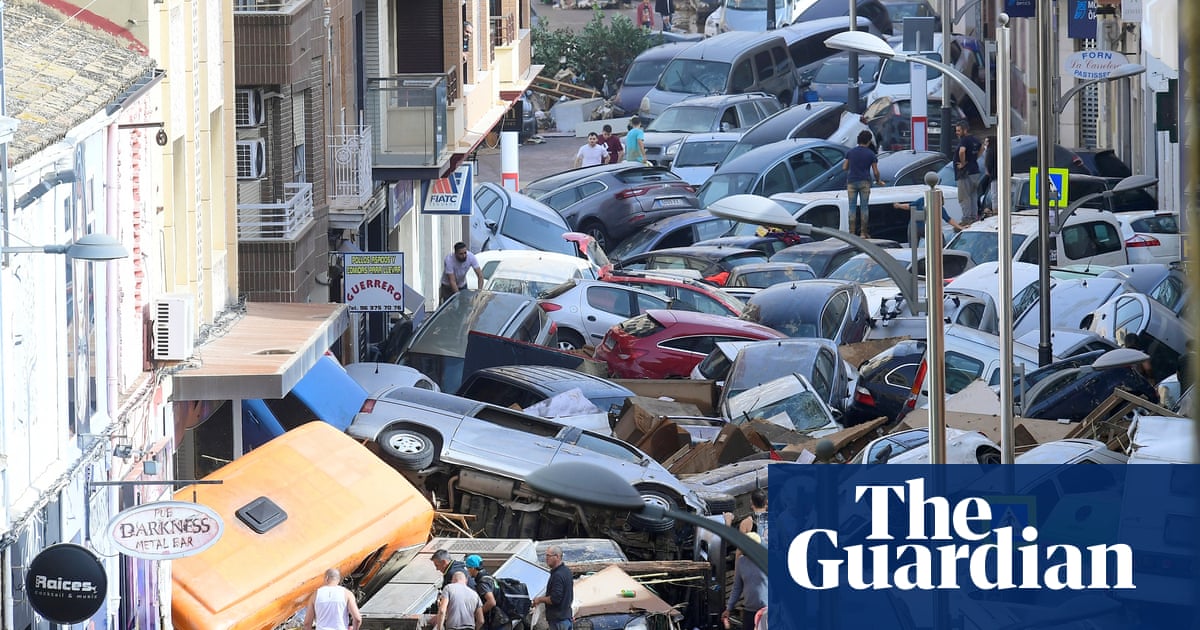The gratitude that greeted Tuesday’s dawn downpours was short-lived in Utiel. When the longed-for rains finally reached the town in the drought-stricken eastern Spanish region of Valencia, they were merciless in their abundance.
“People were very happy at first because they’d been praying for rain as their lands needed water,” said Remedios, who owns a bar in Utiel. “But by 12 o’clock, this storm had really hit and we were all pretty terrified.”
Trapped in the bar, she and a handful of her customers could only sit and watch as Spain’s worst flooding in almost 30 years caused the Magro River to overflow its banks, trapping some residents in their homes and sending cars and rubbish bins surging through the streets on muddy flood waters.
“The rising waters brought mud and stones with them and they were so strong that they broke the surface of the road,” said Remedios, who gave only her first name.
“The tunnel that leads into the town was half-full of mud, trees were down and there were cars and rubbish containers rolling down the streets. My outside terrace has been destroyed – the chairs and shades were all swept away. It’s just a disaster.”
By Wednesday afternoon, the death toll in Valencia and the neighbouring region of Castilla-La Mancha stood at 72. Utiel’s mayor, Ricardo Gabaldón, told Las Provincias newspaper that some of the town’s residents had not survived the floods, but was unable to provide an exact number.
Hours earlier, Gabaldón had told Spain’s national broadcaster, RTVE, that Tuesday had been the worst day of his life. “We were trapped like rats,” he said. “Cars and rubbish containers were flowing down the streets. The water was rising to 3 metres.”
People in the town fear some of the dead may have been older people who were unable to escape the flood waters. Remedios said: “Anyone who could get to higher ground did, but there were some old people who couldn’t even open their front doors and they were trapped there inside their own houses.”
Residents of La Torre, on the outskirts of Valencia city, were confronted by similar scenes on Wednesday morning.
“The neighbourhood is destroyed, all the cars are on top of each other, it’s literally smashed up,” Christian Viena, a bar-owner in the area, told the Associated Press by phone. “Everything’s a total wreck, everything is ready to be thrown away. The mud is almost 30cm deep.”
Spain’s meteorological office, Aemet, said that more than 300 litres of rain per square metre (30cm) had fallen in the area between Utiel and the town of Chiva, 20 miles (50km) away, on Tuesday. In Chiva, it noted, almost an entire year’s worth of rain had fallen in just eight hours.
The ferocious rains have come as Spain continues to experience a punishing drought. Last year, the government approved an unprecedented €2.2bn (£1.9bn) plan to help farmers and consumers cope with the enduring lack of rain amid warnings that the climate would only get worse, and more unpredictable, in the future.
“Spain is a country that is used to periods of drought but there’s no doubt that, as a consequence of the climate change we’re experiencing, we’re seeing far more frequent and intense events and phenomena,” the environment minister, Teresa Ribera, said.
As Wednesday wore on, a distressing picture of the human and economic damage began to emerge. Spain declared three days of national mourning.
The prime minister, Pedro Sánchez, said the entire country felt the pain of those who had lost their loved ones, and urged people to take every possible precaution as the torrential rains moved to the north-east of the country.
The defence minister, Margarita Robles, said 1,000 members of the military emergencies unit had been deployed to help regional emergency services. In a sign that more bodies could be trapped in the mud and in houses, she also offered mobile morgues.
One man used a phone call to RTVE to plead for any news of his son, Leonardo Enrique Rivera, who had gone missing in his Fiat van after going to work as a delivery driver in the Valencian town of Riba-roja on Tuesday.
“I haven’t heard from him since 6.55 yesterday,” said Leonardo Enrique. “It was raining heavily and then I got a message saying the van was flooding and that he’d been hit by another vehicle. That was the last I heard.”
Esther Gómez, a town councillor in Riba-roja, said workers had been stuck overnight in an industrial estate “without a chance of rescuing them” as streams overflowed. “It had been a long time since this happened and we’re scared,” she told Agence France-Presse.
As the search for the dead continued, experts warned that the torrential rains and subsequent floods were further proof of the realities of the climate emergency.
“No doubt about it, these explosive downpours were intensified by climate change,” said Dr Friederike Otto, leader of world weather attribution at the Centre for Environmental Policy, Imperial College London.
“With every fraction of a degree of fossil fuel warming, the atmosphere can hold more moisture, leading to heavier bursts of rainfall. These deadly floods are yet another reminder of how dangerous climate change has already become at just 1.3C of warming. But last week the UN warned that we are on track to experience up to 3.1C of warming by the end of the century.”
There were similar, if differently expressed, sentiments in Utiel on Wednesday. “There was one guy here with me yesterday who’s 73, and he said he’d never seen anything like this in all his years,” said Remedios. “Never.”

